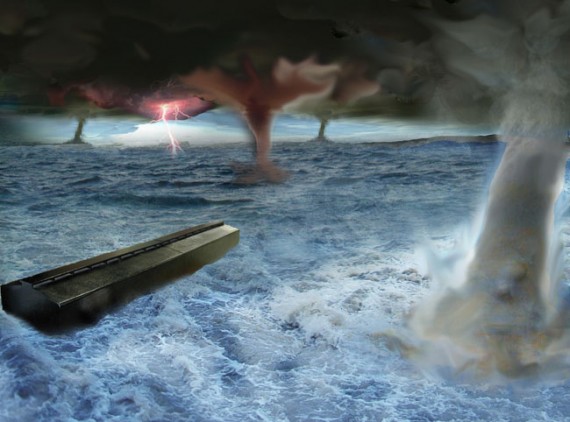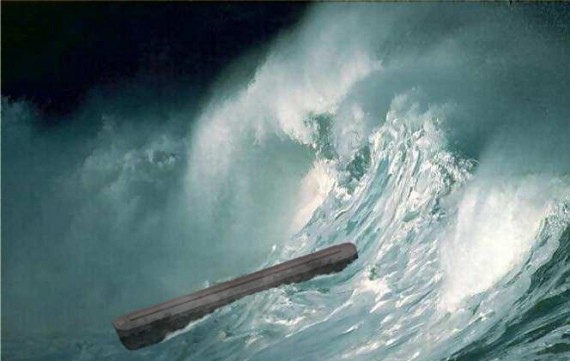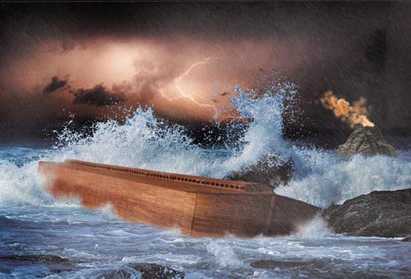Yesterday I presented a way of reading about the flood that was different than the traditional way the flood account is usually read.
Certainly, the way I have proposed is challenging, but let us think momentarily about what the traditional reading says. To reject the view I have presented in previous posts, you either have to go with the traditional reading which says God sent the flood and killed all humanity except for eight people, or you have to categorize the flood account as a historical or literary myth.

Frankly, if the choice is between a God who drowns millions of people and understanding the flood account as a myth, the second option is better by far. The traditional reading of this account says that because God saw how great the violence was upon the earth, He decided to bring even greater violence. The traditional reading argues that because the sin of violence had spread throughout the earth, God was going to trump all their violence with the greatest violence of all.
Can this be true of God?
Does God defeat violence with greater violence?
Can it be right that God’s response to violence is only greater violence?
Does it not seem strange that when God sees violence come upon the earth, His response is an act of supreme violence?
It is extremely strange that the primary sin mentioned in Genesis 6:13 is violence (cf. Genesis 6:11), and the most common way of reading Genesis 6 says that God responded to the sin of violence with greater violence.
How can this way of reading Genesis 6 be correct?
If God is actually trying to show the world a better way—a more loving way, a less violent way—the flood does not seem to be the best course of action. All it really shows is what the human race already believes: that might makes right.
The Flood Failed at Wiping Out Evil
Furthermore, aside from annihilating every living thing on earth except for the humans and creatures in the ark, the violent response of God toward evil didn’t really accomplish anything. Some seem to think that God intended to wipe out evil with the flood, but He knows that this is impossible, as He Himself states in Genesis 8:21.
The condition of humanity as having every inclination and imagination of their hearts only evil all the time didn’t change one bit as a result of the flood. It was this way before the flood, and it was this way afterwards as well (cf. Genesis 6:5 with Genesis 8:21). If God’s goal in the flood was to teach people not to be so evil, He failed miserably, and got a lot of human blood on His hands in the process (Fretheim, God and World, 81). This not only seems overly violent, but incredibly foolish of God.
If God knew beforehand that the flood wouldn’t “work,” why send it?
The Traditional Way of Understanding the Flood is Incorrect
This is why the text seems to hint that God didn’t send the flood.
It appears, based on several clues within the text itself, that the traditional way of reading the text is not correct.
Though the traditional reading is what the text seems to say on the surface, the revelation we have received in Jesus Christ challenges us to look beneath the surface of these deep and troubled waters to discern something else going on in the flood event than a violent God foolishly seeking the near-extermination of everything that breathes on earth.

The alternative perspective helps us understand that when worldwide destruction was coming up on the earth as a result of mankind becoming extremely evil and violent, God stepped in to save and rescue those who would follow Him. This truth is not only hinted at in Genesis 6–8 itself, but also in the parallel accounts in Job, Isaiah, Matthew, and 2 Peter, all of which we have looked at earlier (See the link list on this post: When God Pled Guilty)
Genesis 6-8 Summarized
When God saw that this destruction was inevitable, He set in motion a series of events to rescue and deliver as many people as He could from this great evil. He called out Noah to build the ark and proclaim deliverance from the destruction that was coming. When that destruction came, it was not by the hand of God, but He nevertheless took the blame for it by inspiring the biblical author of Genesis 6–8 to record that He was sending the flood.
In reality, far from sending the flood, God did all He could to rescue people from it. In the end, only eight people were delivered when the flood waters came upon the earth.
 How can a God who says "Love your enemies" (Matthew 5:44) be the same God who instructs His people in the Old Testament to kill their enemies?
How can a God who says "Love your enemies" (Matthew 5:44) be the same God who instructs His people in the Old Testament to kill their enemies?
These are the sorts of questions we discuss and (try to) answer in my online discipleship group. Members of the group can also take ALL of my online courses (Valued at over $1000) at no charge. Learn more here: Join the RedeemingGod.com Discipleship Group I can't wait to hear what you have to say, and how we can help you better understand God and learn to live like Him in this world!




 In seeking to understand what is going on in the account of the flood and why the waters that came upon the earth, we must understand the Ancient Near East cosmology. That is, what they thought about how the world worked, and what connections existed between the spiritual realm and the physical realm.
In seeking to understand what is going on in the account of the flood and why the waters that came upon the earth, we must understand the Ancient Near East cosmology. That is, what they thought about how the world worked, and what connections existed between the spiritual realm and the physical realm.
 When I first sat down to study and research the flood account through the lens of Jesus Christ, I initially thought that the key to this text was found in faulty English translations.
When I first sat down to study and research the flood account through the lens of Jesus Christ, I initially thought that the key to this text was found in faulty English translations.
 Of all the violent texts in the Old Testament, the portrayal of the flood in Genesis 6–8 may be the most difficult text to understand.
Of all the violent texts in the Old Testament, the portrayal of the flood in Genesis 6–8 may be the most difficult text to understand. Aside from the grim image of every living thing on earth gasping for breath and choking on water as they sink beneath the waves, the flood story also paints a troubling portrait of a God who seems incompetent because He regrets that He made mankind (Didn’t He know this would happen?), and who then foolishly tries to solve the world’s addiction to evil and violence by committing the greatest atrocity of all: worldwide genocide. One author describes the story with these words:
Aside from the grim image of every living thing on earth gasping for breath and choking on water as they sink beneath the waves, the flood story also paints a troubling portrait of a God who seems incompetent because He regrets that He made mankind (Didn’t He know this would happen?), and who then foolishly tries to solve the world’s addiction to evil and violence by committing the greatest atrocity of all: worldwide genocide. One author describes the story with these words: